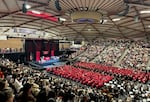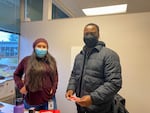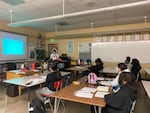OPB has been following 27 students since they were in first grade as part of the Class of 2025 project to track the state's progress toward 100% high school graduation starting in 2025.
For eight years, graduation mentors at David Douglas High School have worked one-on-one with students, getting to know them, helping them communicate with their teachers, prioritizing assignments and class schedules, and eventually seeing them graduate from high school.
Over the first few years, graduation rates at the Southeast Portland high school rose significantly, to 80% before the COVID-19 pandemic and 86% for the Class of 2020. Yet after the pandemic, graduation rates dropped, and have not recovered. The school’s graduation rate for the Class of 2024 was 70%.
This spring, David Douglas administrators decided to cut its four graduation mentor positions for next year.
For almost 10 years, the grad mentors have worked with teenagers who have gone years without a good relationship with school. They focus on students as early as freshman or sophomore year, who may be failing multiple classes and are at risk of not graduating. They don’t worry about students who’ve earned straight A’s but hit a snag.
Getting students to graduation is a big challenge for many Oregon school districts. But so is balancing the budget.
Like many school districts, David Douglas faces a challenging financial future, caught between declining enrollment and higher costs. David Douglas’ enrollment drop has been larger than others, with an 18% decline in student population districtwide from 2015 to 2024. The high school, the largest in the state, has lost more than 600 students in that time, a decline of 21%.
“Tough decisions, tough times,” said David Douglas Superintendent Ken Richardson when asked about the grad mentor cuts at a board meeting earlier this month.
The “short-term” reality is that the roles will be cut, he said. But the long-term plan to improve graduation rates is a focus on freshmen, utilizing data points like 9th grade on track, which measures how many students have completed 25% of their high school credits by the end of freshman year.

FILE - The Class of 2024 graduation for David Douglas High School, held June 6, 2024, at the University of Portland's Chiles Center. The Class of 2024 had their whole high school careers affected by the pandemic.
Elizabeth Miller / OPB
The David Douglas graduation mentors say they do focus on freshmen and sophomores. In an interview, the graduation mentors expressed concern for future students attending school in an environment without staff dedicated to helping the most struggling students.
When Dana Matulewicz and Greg Carradine started working at David Douglas High, the main focus was attendance, a challenge Oregon has not yet solved. But as the school started zeroing in on attendance, the team noticed something: students would come to school, but they’d be flunking all of their classes.
“That kid is still showing up, but there’s something else going on,” Carradine said.
The problem? Students didn’t feel connected to their teachers. They weren’t able to share the issues going on at home and in their lives that were keeping them from being successful.
“They weren’t comfortable talking to their teachers, they weren’t comfortable advocating for themselves,” Carradine said.
“You have to remember these are kids - even though they’re in high school, they’re still kids, so they still needed to learn how to advocate for themselves.”
That’s where Carradine, Matulewicz, Dylan Souders, and Maria McKinney come in.
These four adults are kind of that middle person between the student and the teacher. The graduation mentors meet with students weekly, biweekly, or monthly to get to know them, figure out what’s going on, and help them make a plan to be successful.

Graduation mentors Greg Carradine Jr., right, work with students in need of extra support and one-on-one mentorship. They start working with students as freshman and follow them through to graduation.
Elizabeth Miller / OPB
McKinney works mostly with freshmen and sophomores. Matulewicz works with seniors. Carradine and Souders work with students across grades. Each graduation mentor has a caseload of about 50 students, and monitors the grades and progress of about 50 more.
“The goal of every student that has a grad mentor is to get them out of the grad mentor program, to get them self-sufficient,” Souders said. “So when they graduate [from the program], inevitably, they’re good to go on their own — they don’t just keep leaning on us.”
It takes time and trust to build these relationships. The grad mentors encourage students, celebrating little wins and successes.
But they also explain and demystify how high school works, especially for freshmen.

FILE - Graduation mentors first meet students at Ninth Grade Counts, a monthlong bridge program to prepare students for the transition to high school. The Class of 2025 attended Ninth Grade Counts in 2021.
Elizabeth Miller / OPB
“I have freshmen that don’t even understand that one class is a half a credit,” McKinney said. “They don’t understand what a semester is. They think they have all this time, they don’t understand that time is valuable, and wasting it — that can be costly later.”
The graduation mentors aren’t the only ones losing their jobs at David Douglas. The high school also had to make a reduction of nine full-time-equivalent employees on the teaching staff.
“None of these decisions were made lightly,” said DDHS principal Jennifer Buscher in an email to OPB.
“Ultimately, this decision was made by our building leadership team after a thorough review of school-level data. In response to required staff reductions, we prioritized alignment with both student needs and new mandates from the Oregon Department of Education, which emphasize increased staffing and support for 9th-grade transition efforts.”
The graduation mentor team is usually part of that ninth grade transition. When students in OPB’s Class of 2025 attended Ninth Grade Counts, a summer program to help students prepare for high school, the graduation mentors were there, along with middle school graduation mentors, creating a trusted adult “handoff” from middle to high school.
“We focus on all grades,” graduation mentor Matulewicz said.
What this means for students
In the absence of the graduation mentors next year, Principal Buscher said counseling and attendance staff will take on some of the responsibilities of the team.
“By integrating this work into multiple positions, we aim to maintain consistent support for students while remaining within our budget limitations,” Buscher said.
The graduation mentors worry about the effect this may have on the students they work with — students who may have had a tenuous relationship with school to begin with.
“Kids are pretty upset and I’m slightly nervous about, ‘OK, who is going to be their realist? Who is going to be there,’ ‘OK here’s the way to accomplish this?’” Souders said. “While we want them all to be at that point, to be able to do it themselves, it doesn’t necessarily happen all the time.”

FILE - Graduation mentors send cards to students they work with to celebrate wins, but also to reach out if they haven’t seen students in a while.
Elizabeth Miller / OPB
Souders is on the football coaching staff and serves as the staff advisor for the Pacific Islander club at school. He said the group has had a different advisor each of the last three years due to staff leaving or positions being cut.
In addition to his day job, Carradine heads the junior varsity football team, the freshman basketball team, and a middle school track team in the district. He said he often helps make sure student-athletes get their grades up in order to play sports.
“We’re just more than just a mentor to them… we’ve really broken down barriers with them,” Carradine said. “When everything is on fire around here for them, they come into the grad center, and it’s a place where they feel comfortable.”
McKinney, the mentor who works with freshmen and sophomores, worries about compounding trauma for students who may not have trusted adults at home. For some, she is their trusted adult.
“For us, because we are not in the classroom … we have that positive relationship with them, so we’re not a part of that system of discipline,” McKinney said.
“They’re able to trust us in that way, and talk to us because maybe they really have these real issues that they need to work out.”
It’s unclear how this may affect David Douglas’ graduation rates going forward, and what effect the cut might have on the long-term, supportive relationships that McKinney and the other grad mentors have been able to build
“When I tell them [students], they’re like, ‘well why?’ ‘Why get rid of a good thing?’” McKinney said.
It’s Matulewicz’s job to help students during senior year get to graduation. On a typical day, she has several students come in and out of her office, telling her what’s going on with them. She helps them make a plan and find a way to graduate. The grad center is closing at the end of the school year, and there won’t be dedicated non-classroom staff to help those students.
“It’s sad that the program is going away because the kids need it,” Matulewicz said. “It’s hard. It’s hard for them, it’s hard for us, we don’t understand, really.”
Going forward, Buscher said David Douglas will focus more on “early intervention” efforts to support students at the beginning of their high school career.
“Our goal is to creatively leverage existing resources, enhance our attendance initiatives, and maintain manageable counselor caseloads.”
